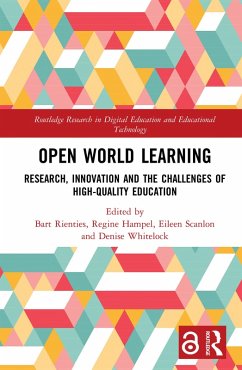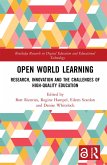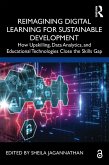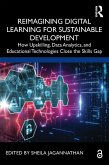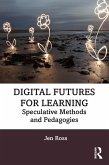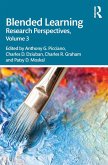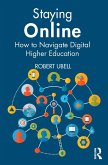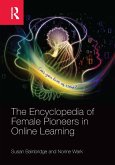Open World Learning (eBook, ePUB)
Research, Innovation and the Challenges of High-Quality Education
Redaktion: Rienties, Bart; Whitelock, Denise; Scanlon, Eileen; Hampel, Regine
0,00 €
0,00 €
inkl. MwSt.
Sofort per Download lieferbar

0 °P sammeln
0,00 €
Als Download kaufen

0,00 €
inkl. MwSt.
Sofort per Download lieferbar

0 °P sammeln
Jetzt verschenken
Alle Infos zum eBook verschenken
0,00 €
inkl. MwSt.
Sofort per Download lieferbar
Alle Infos zum eBook verschenken

0 °P sammeln
Open World Learning (eBook, ePUB)
Research, Innovation and the Challenges of High-Quality Education
Redaktion: Rienties, Bart; Whitelock, Denise; Scanlon, Eileen; Hampel, Regine
- Format: ePub
- Merkliste
- Auf die Merkliste
- Bewerten Bewerten
- Teilen
- Produkt teilen
- Produkterinnerung
- Produkterinnerung

Bitte loggen Sie sich zunächst in Ihr Kundenkonto ein oder registrieren Sie sich bei
bücher.de, um das eBook-Abo tolino select nutzen zu können.
Hier können Sie sich einloggen
Hier können Sie sich einloggen
Sie sind bereits eingeloggt. Klicken Sie auf 2. tolino select Abo, um fortzufahren.

Bitte loggen Sie sich zunächst in Ihr Kundenkonto ein oder registrieren Sie sich bei bücher.de, um das eBook-Abo tolino select nutzen zu können.
This book provides state-of-the-art contemporary research insights into key applications and processes in open world learning. Open world learning seeks to understand access to education, structures, and the presence of dialogue and support systems
- Geräte: eReader
- ohne Kopierschutz
- eBook Hilfe
- Größe: 13.59MB
Andere Kunden interessierten sich auch für
![Open World Learning (eBook, PDF) Open World Learning (eBook, PDF)]() Open World Learning (eBook, PDF)0,00 €
Open World Learning (eBook, PDF)0,00 €![Reimagining Digital Learning for Sustainable Development (eBook, ePUB) Reimagining Digital Learning for Sustainable Development (eBook, ePUB)]() Reimagining Digital Learning for Sustainable Development (eBook, ePUB)39,95 €
Reimagining Digital Learning for Sustainable Development (eBook, ePUB)39,95 €![Reimagining Digital Learning for Sustainable Development (eBook, PDF) Reimagining Digital Learning for Sustainable Development (eBook, PDF)]() Reimagining Digital Learning for Sustainable Development (eBook, PDF)39,95 €
Reimagining Digital Learning for Sustainable Development (eBook, PDF)39,95 €![Digital Futures for Learning (eBook, ePUB) Digital Futures for Learning (eBook, ePUB)]() Jen RossDigital Futures for Learning (eBook, ePUB)38,95 €
Jen RossDigital Futures for Learning (eBook, ePUB)38,95 €![Blended Learning (eBook, ePUB) Blended Learning (eBook, ePUB)]() Blended Learning (eBook, ePUB)40,95 €
Blended Learning (eBook, ePUB)40,95 €![Staying Online (eBook, ePUB) Staying Online (eBook, ePUB)]() Robert UbellStaying Online (eBook, ePUB)33,95 €
Robert UbellStaying Online (eBook, ePUB)33,95 €![The Encyclopedia of Female Pioneers in Online Learning (eBook, ePUB) The Encyclopedia of Female Pioneers in Online Learning (eBook, ePUB)]() Susan BainbridgeThe Encyclopedia of Female Pioneers in Online Learning (eBook, ePUB)48,95 €
Susan BainbridgeThe Encyclopedia of Female Pioneers in Online Learning (eBook, ePUB)48,95 €-
-
-
This book provides state-of-the-art contemporary research insights into key applications and processes in open world learning. Open world learning seeks to understand access to education, structures, and the presence of dialogue and support systems
Dieser Download kann aus rechtlichen Gründen nur mit Rechnungsadresse in A, B, BG, CY, CZ, D, DK, EW, E, FIN, F, GR, HR, H, IRL, I, LT, L, LR, M, NL, PL, P, R, S, SLO, SK ausgeliefert werden.
Produktdetails
- Produktdetails
- Verlag: Taylor & Francis eBooks
- Seitenzahl: 298
- Erscheinungstermin: 25. Januar 2022
- Englisch
- ISBN-13: 9781000512236
- Artikelnr.: 63296069
- Verlag: Taylor & Francis eBooks
- Seitenzahl: 298
- Erscheinungstermin: 25. Januar 2022
- Englisch
- ISBN-13: 9781000512236
- Artikelnr.: 63296069
- Herstellerkennzeichnung Die Herstellerinformationen sind derzeit nicht verfügbar.
Bart Rienties is Professor of Learning Analytics and the Institute of Educational Technology at the Open University, UK. Regine Hampel is Professor of Open and Distance Language Learning at the Open University, UK, and Associate Dean (Research) in the Faculty of Wellbeing, Education and Language Studies. Eileen Scanlon is the Regius Professor of Open Education and Associate Director of Research and Innovation at the Institute of Educational Technology, Open University and an Honorary Professor at the Centre for Digital Education, University of Edinburgh, UK. Denise Whitelock is Professor of Technology Enhanced Assessment and Learning at the Open University, UK and Director of the Institute of Educational Technology.
1. Introduction. 2. Powers and Limitations of open world learning: Experiences from the Field of Education. Part 1 Learners and the power of language in an Open World. 3. Digital stories in science: the role of story sequencing. 4. Can WhatsApp facilitate interaction? A case study of adult language learning. 5. First steps towards self-regulated learning: Setting goals in MOOCs. 6. Discourse practices in MOOC discussions: A corpus linguistic approach. 7. Simplification of Open Educational Resources in English: Exploring its effect on text processing of non-native English speakers. 8. Culturally-adaptive learning design - A mixed-method study of cross-cultural learning design preferences in MOOCs. Part 2 Innovative technologies in an Open World . 9. Accessibility in MOOCs: the stakeholders' perspectives. 10. Internet kiosks in Uganda: A window of opportunities? 11. Eliciting students' preferences for the use of their data for learning analytics: A crowdsourcing approach. 12. Measuring player creativity in digital entertainment games using the Creativity in Gaming Scale. 13. Incorporating student opinion into opinion mining: A student sourced sentiment analysis classifier. Part 3 Educators and inclusive practice in an Open World. 14. Informing learning design in online education using learning analytics of student engagement. 15. UDL and its implications in MOOC accessibility evaluation. 16. Antecedents and consequences of uncertainties perceived by finance professionals. 17. The identity trajectories of older academics: workplace affordances and individual subjectivities. 19. Reflecting on the main findings and practical applications
1. Introduction. 2. Powers and Limitations of open world learning: Experiences from the Field of Education. Part 1 Learners and the power of language in an Open World. 3. Digital stories in science: the role of story sequencing. 4. Can WhatsApp facilitate interaction? A case study of adult language learning. 5. First steps towards self-regulated learning: Setting goals in MOOCs. 6. Discourse practices in MOOC discussions: A corpus linguistic approach. 7. Simplification of Open Educational Resources in English: Exploring its effect on text processing of non-native English speakers. 8. Culturally-adaptive learning design - A mixed-method study of cross-cultural learning design preferences in MOOCs. Part 2 Innovative technologies in an Open World . 9. Accessibility in MOOCs: the stakeholders' perspectives. 10. Internet kiosks in Uganda: A window of opportunities? 11. Eliciting students' preferences for the use of their data for learning analytics: A crowdsourcing approach. 12. Measuring player creativity in digital entertainment games using the Creativity in Gaming Scale. 13. Incorporating student opinion into opinion mining: A student sourced sentiment analysis classifier. Part 3 Educators and inclusive practice in an Open World. 14. Informing learning design in online education using learning analytics of student engagement. 15. UDL and its implications in MOOC accessibility evaluation. 16. Antecedents and consequences of uncertainties perceived by finance professionals. 17. The identity trajectories of older academics: workplace affordances and individual subjectivities. 19. Reflecting on the main findings and practical applications
